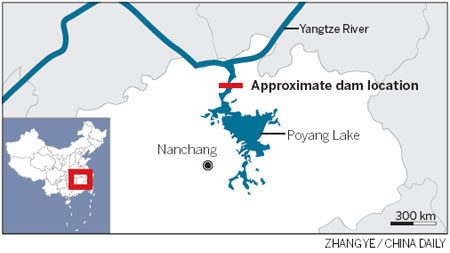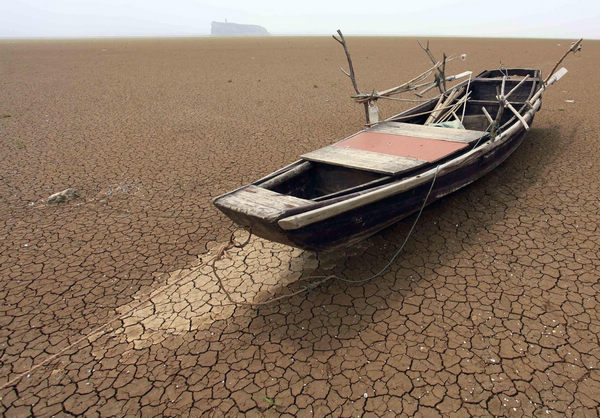Project to block China's largest freshwater lake sparks widespread controversy, Li Jing reports from Beijing.
In areas where rain is scarce it is common to see people storing water to get them through dry seasons.
Using the same principle, officials want to dam a major lake in Jiangxi province that has shrunk noticeably but their plan has run into opposition.
|
 |
|
Little egrets are a common sight on Poyang Lake's wetland areas in mid-February. The country's largest freshwater lake, which is in East China's Jiangxi province, is also a crucial winter habitat for migrating birds, many of which are endangered, according to conservationists. [Provided to China Daily] |
Their proposal to dam Poyang Lake took a major step forward this month when it won the backing of the Hydroelectricity Planning Institute.
Since 2008, the eastern Chinese province has strongly lobbied leaders in Beijing, lauding the project as a way to tackle drought as well as adjustments to the water flow caused by the massive Three Gorges Dam upstream.
But critics of the 10 billion yuan ($1.58 billion) plan say authorities have played down the potentially disastrous ecological impact that a dam might bring to China's largest freshwater lake. It is also a crucial winter habitat for endangered migrating birds protected under international conventions.
Environmentalists have also cast doubt on the independence of crucial ecological assessments.
|
 |
The province's proposal, which features a 3-kilometer-wide dam with sluice gates across the narrowest part of a channel linking Poyang Lake and the Yangtze River, was put to the Hydroelectricity Planning Institute on Feb 12.
After two days of discussions, the institute, which is affiliated to the Ministry of Water Resources, offered its support, China News Service reported.
The verdict takes the project into the final stages of the decision-making process, the report said, yet to get full central-government approval it still needs to clear the State Council and the National Development and Reform Commission, the country's economic planner.
Important habitat
Poyang Lake is fed by five rivers and is connected to the lower reaches of the Yangtze. Its water flows into the Yangtze during dry seasons (September to March) and is replenished by flooding during rainy seasons (May and June).
 |
|
A fishing boat on the dry bed of Poyang Lake during the severe drought in May. The dam project is intended to prevent further damage to the lake. [Zhang Jun / Xinhua] |
The annual change in the lake's water level has helped maintain one of the most important wetlands in the world, home to more than 120 species of fish and 300 varieties of bird.
Yet, the water has been continuously low over the past year. A prolonged drought the worst in 60 years saw the lake dwindle to less than 200 square kilometers in January, down from a peak of 4,900 sq km.
The drinking water supplies of people living nearby and their livestock have been threatened, while fishing resources are dwindling, making life difficult for both fishermen and water birds.
Figures from Jiangxi's hydrological bureau show Poyang Lake received 30 percent less rain than usual last year. Yet, experts say the lack of precipitation is not the only reason for the frequently low levels.
In addition to changing climate patterns on middle and lower reaches of the Yangtze, water storage at Three Gorges Dam and increased water consumption by surrounding communities are also contributing factors, said Wang Shengrui at the China Research Academy of Environmental Sciences.
Citing official statistics covering 1952 to 2010, he said extremely low water levels (shallower than 8 meters) were reported seven times six times after 2003, when Three Gorges Dam began to store water for electricity generation.
"The seasonal decline of the water level each winter also starts earlier and lasts longer," said Wang, who previously worked on a water pollution study for Poyang Lake.
